- Home
- Marge Piercy
Braided Lives Page 4
Braided Lives Read online
Page 4
Then one July afternoon we were playing poker for bottle caps at Dino’s house, his parents being both at the bakery. I remember I was winning and in the excitement I was paying little attention until Dino and Callie went into the bedroom and shut the door. Even then I didn’t worry until time passed and passed and Freddie and Sharkie started making jokes I didn’t want to understand.
The game ended. I waited and waited for her. Freddie tried to get me to go upstairs with him. “Bug off,” I said, beginning to feel sick with anxiety. It was getting near five and we both had to be home. Finally I banged on the door.
“Don’t be a jackass,” Freddie warned. “Dino’ll bust you in the snoot if you barge in on him.”
But they were done. Callie strolled out buttoning her blouse, while Dino did not bother to put his shirt on. He said a long good-bye at the door, kissing her sloppily, but did not offer to walk us home.
Right on the corner of Tireman by the drugstore we had a big fight. “Did you fuck him, Callie? Did you?”
“So what if I did?”
“You could get pregnant!”
“No, I can’t. I never got the curse yet.”
“Callie! Why did you want to do that?”
“Dino’s cute. He’s the cutest boy I know. You’re just jealous. You like him too.”
I was stung because I did have a crush on Dino. Everybody said Freddie was better-looking, but Dino was quicker in his words and his thoughts and how he moved. I associated him with my beautiful black-and-white tomcat Lightning I had till he was killed; but I could not imagine doing whatever Callie did with Lightning or Dino.
Callie took my arm. “You can have Freddie.”
“I don’t want Freddie! Why did you do that?”
“Let me be, Jill. I bet you could get Freddie. Easy.”
“Besides, I got my periods. Last year.”
Callie yanked her arm away. “You’re just chicken! Just a baby chicken! But I’m growed up and I’m going to act like it.”
I went home weeping through the alleys, so no one would see me. The bond between us snapped. Not only was Callie instantly absorbed in Dino, doting on him and fetching and taking his coarse lip, but she dropped me into unimportance, a bystander in her real life. A year later Dino passed her on to Sharkie, whose kid she had. Freddie wanted me to be his girl, so I was, but I wouldn’t do more than neck with him.
I sit up on the glider, chafing my cold hands. Lately reading psychology books and adult novels, I found a label for my adventuring. Am I sick? Am I depraved? “Am I an L.?” I write in my notebook, scared to spell out lesbian. Not only were our games wicked, it turns out, but they were worse than regular terrifying real sex. I can hardly believe that, but there it is in black and white, and I have to trust books over my own unlikely and childish experiences. Perhaps I’m already crazy? I talk to myself, I make up fantasies I care more for than my homework, and I am not popular, blond or going steady—nothing a teenager should be. I have never had a real date like I read about or see on TV. I still miss Callie. Now she is changed forever from the mischievous soulful runt who buried pheasants with me to a housewife padding around in slip and feathered mules, a permanent whine in her voice and a puzzled frown pulling at her wide mouth.
Francis’ guitar is leaning against the wall in its battered case, its female curves drawing my eyes. I am staring at it in my usual vague welter of want and revulsion when the door downstairs bangs open.
“Jillie? Are you hiding up there again? Who do you think is going to wash your dishes for you? Santa Claus?”
When I climb down the steps, however, she is standing at the bottom wrapped in the red kimono Francis brought back from Japan. Her small mouth puckers with gloom. “I can’t decide what to wear. And my hair won’t come right.”
“It looks fine to me.”
“Like a cat caught in a fan!” She puts a hand coquettishly to her throat. “You do it so well. And Charlotte’s hair will be all done. She goes to the beauty parlor every Friday.”
We spread dresses on the bed. “Say, isn’t this new?”
She gives it a punishing slap. “Since when do I have a penny to spend on myself? I picked it up on sale, ages ago.”
Letting the kimono slide from her plump shoulders she beckons for the dress, turquoise with white flowers. I take up the comb. “Your hair’s in good form. You’ll see, it’ll look fine.” Page boy, handmaiden, mirror to my mother, you see me in a role I have played since I was old enough to sit up and say yes to her tales and complaints, in recent years consciously disarming her wary jealousy by flattery. Why she is jealous is opaque to me, for all I do with a mirror is make faces. Even before my own reflection over her head as she flirts with herself, I avert my eyes self-consciously. I have seen my mother naked hundreds of times, for she often calls me in to wash her back, but I rarely see my father less than fully dressed. Even bathing suits are unusual. In center city Detroit there is not a lot of water around, even though when you look at the Great Lakes on a map, we look as if we’re afloat. Maybe twice a summer we go to a beach. I am scared of the water, as of so much else; I have all my mother’s fears and a few extra. Although I learned to swim in high school, I would feel disloyal. Dad can swim but Mother can’t. To swim would be to desert her, clutching my hand, nervous in a foot of water.
“So he wants you to share a room with the skinny blond one.” She snorts. “What’s the use of going away to Ann Arbor if you don’t meet new people and make useful contacts? You never got on with your father’s people anyhow.”
He comes in, taking a tie from the door rack and whipping it playfully at her behind. He is impatient for the company of men where a couple of drinks will loosen his humor. He has strict notions what talk becomes a man: baseball, football and hockey in their seasons, union matters and politics—if the other fellows are regular Democrats too. When he mentions Roosevelt his voice catches. The thirties were his Armageddon. Although his work is dirty, he puts on a suit as often as he can, for his father taught him not to dress like a workman. “Yes, sir, we’ll beat the pants off Gene and Charlotte.”
“Oh?” She turns, her eyes glinting anger. “So that’s what you’d like to do to Charlotte? I’ve always suspected as much.” It is impossible to tell if she is joking. Does she know?
He gives his hair a quick rake and tosses the comb to his bureau. “Hustle it up or they’ll be asleep before we get there.” He looks well in a suit, for he is lean.
Mother chirps around him picking off lint. Suddenly her eyes are doleful. “If Gene suggests playing for money, you put a stop to it. How much are you taking?”
He brushes ash from his lapel. “Don’t worry about it.”
“With the refrigerator and the TV still not paid for! It would shame us before the neighbors if they take them away!”
I stand at the front window while the Packard pulls from the driveway. My father will not drive a Ford or a GM car. He remembers how Bennett’s Ford Service fired on the unemployed and how they beat the UAW people, mostly women, who came to leaflet outside the gate, breaking the back of one and fracturing another’s skull. He describes the sit-down strikes at GM. We have Terraplanes, Hudsons, Studebakers until they fail one by one. “Henry Ford hated Jews,” my mother whispers. “Ford was a union buster,” my father mutters. History soaks into me.
Then I draw the blinds and swirl around. Empty, empty house. I run to do the dishes twice as fast as usual, so that the house is truly mine, without duty standing at my shoulder interrupting.
Done, flushed with the heat of the water, I grab a glass and clatter downstairs past the grade door that leads to the yard. Damp shadows lean on me breathing rotting potatoes as I hurry past the stout-armed furnace where firelight plays on the cement, dodging under the line where Dad’s overalls drip, past his workbench and power tools, into the fruit cellar.
I love the bright jars, golden peaches, buff pears, dark berries, the quarts of tomato juice, the half-pints of strawberry and raspberry jam, a
lthough I hate the season when I help Mother put them up. Superimposed images. September is my season for canning peaches. I like putting up the fruit I grow. I become my mother in joy. After thirty her strengths and virtues began to bloom in me, her dislike of waste, her witch’s way with plants and birds and furry animals, her respect for sunlight and clean water and soil built well with compost.
Dad’s Christmas bottle of Old Grand Dad is hidden by a row of home-canned tomatoes. The damp creeps along my arms, seeks the neck of my sweater. Taking care not to disturb the dust I pour an inch in my tumbler, return the bottle, return the tomato pints to their circles on the newspaper-covered shelf, return myself tumbler in hand fleeing the shadows upstairs.
I loll on the bumpy rust-colored couch that fills one wall, sipping my prize and contemplating whether or not to turn on the TV. In the curve of gradual acquisition of TVs on our block, we were average. I was in the ninth grade. Had we gotten it earlier, I am convinced I would not have become a compulsive reader and thus the ability to study my way out of here would have been closed to me. At first we watched every night, but now it is theirs and I am grateful to it for occupying them while I steal away into my privacy. Still I have warm memories. During the Kefauver hearings my besotted mother let me stay home from school pretending the flu during the best parts so we could watch together, mesmerized. “Not that the businessmen aren’t just as big crooks,” she reminded me. “And the senators are all in their pockets. All riches are robbery.” But she couldn’t resist the spectacle. Our last period of passionate rapprochement was during the recent trial of the Rosenbergs. That scared my mother. We never spoke of it in front of Dad. We didn’t fight even about the books I read and I stayed downstairs in the evenings. We are sure they will be pardoned, still. They cannot kill a mother with children over some nonsense with matchboxes. Dad does not suspect how much radical identification she has passed on. Not that she can argue a political position, but the passion and loyalty she has given I can attach to a base of reading and observation. Logic I learned from him. You have to argue a case if you want anything out of him, unless you proceed by indirection, as she always does.
Small room with aqua walls bedizened with pictures of snow-capped mountains, with plaques of grapes (including the one I was painting at day care when the Detroit race riots came into our neighborhood), with hanging begonias in planters shaped like puppies. The tormented pattern of the rug struggles between runners of green and brown put down where it has worn. Two corners are hung with knickknack shelves of huddled china giraffes and elephants, gilded cups and saucers, wigwams, souvenirs of Mackinac Island, the Blue Hole, the Wisconsin Dells.
I march to the radio and turn on one of the benefits of Detroit, the CBC that pumps real music at me. This time I make it loud so it fills the house, an aquarium of music where I rise and sink, suddenly graceful. I leap and twirl and prance and kick until the music stops and I drop in a heap on the floor looking at the raw underside of the table. The edge of the tablecloth Buhbe crocheted hangs down all around. Would she still love me? Or would she judge me nasty as Mother does? Warm cinnamon lap, tales told all different from the way Mother told them, like turning the figures in a photograph around and seeing their backsides.
Slow and romantic violin. I dance but I am longing for U.S.A. which I am two thirds of the way through. Librarians so tight and clammy. That one wouldn’t let me have U.S.A. without Mother’s note. “My daughter Jill has my permission to read any book in the collections of the library. Only through wide and uncensored reading has a young person’s mind …” I learned to forge notes by seventh grade, when Callie and I began to cut school occasionally.
I finish the bourbon, shuddering as I subside on the couch. I have a conviction that mixed drinks are inauthentic. The worse the bourbon stings my throat, the more adult it seems. He will be tall and brilliant and terribly witty. I love the word urbane, although I am not sure exactly what it means. “Bourbon is urbane,” I say aloud, dressing him in a romantic ruffled white shirt and dark pants as his eyes focus on me intense and molten with an electrifying stare. The concert ends in applause and I switch off the radio…. I saw To Have and Have Not four times. That’s how it ought to be, both the man and the woman wanting each other and dueling a little and making wisecracks but showing bravery and loyalty. I want to be brave. Maybe I can add Lauren Bacall to my list. I adore her. Yes, I’ll do that, but not now. Silence chills the house. The ceiling creaks into footsteps. The wind whines at the panes, trying the catches. I want my notebooks and my novel but I’m suddenly scared of the attic.
In my mind the tall and handsome stranger in the ruffled shirt is still standing there with smoldering eyes but suddenly he is close up and turns into Freddie that time he came in while I was here alone ironing my father’s shirts. I see his face hard and angry and I remember the terror that gripped me on the kitchen floor when I realized he wasn’t going to listen to my firm loud nos that time. Terror twitched me violently as a bad shock and I bucked under his weight, his hands fumbling at my breasts, hurting me. I punched him in the ear as hard as I could and then I twisted free and grabbed the hot iron. He backed off then. I still don’t like to remember his face. How can I find any link between the music that stirs my emotions and the violent grappling that doesn’t? Something’s wrong with me.
Will no one ever love me? I am single and perverse. My fingers tingle but I don’t know if I am stung with loneliness or over flowing to reach out in abundance. The squat black shape of the phone draws me. I can’t call Howie because it’s Friday night. The receiver sings in my hand. My few girlfriends are out on dates. I dial my own number except for two digits changed at random. Ring. Ring. Where, in what front hall or beside a bed, on a desk or kitchen wall? Harsh sound alerting their air.
“Hello?” Male voice, deep and a little too loud.
No matter. “Hello? Hello, I love you.” Down with the receiver. My face burns my cold fingers. I am crazy.
I pin my hair under Francis’ old wool cap. I have been growing my black hair over protest for two years and it comes partway down my back and ties on my head in a perfect knot. I slip on my suede jacket and stand a moment on the porch, checking the time and that I have my house key. If I get back by ten thirty, they will never know I have been out. My neighborhood is supposed to be dangerous, but I go about as I choose. I figure I run fast. In jeans and jacket and Francis’ cap I pass for a boy. I know that too is somehow wicked but it gives me a free pass through these blocks.
I am off and running toward Callie’s flat over the bakeshop on Joy Road. I don’t bother to call. Callie will be there with her baby and it’s much too early for Sharkie to come home. I’m ashamed of myself, running to what is left of her. She makes me sad, but the house I always think I want to myself makes me taste loneliness harsh as the bourbon. Callie will sulk at first but I’ll listen to her complain about Sharkie and I’ll dandle and admire baby Marilyn and tell Callie all the dirt I can remember about kids in school. I’ll turn somersaults to stir her out. of her sulk. I wonder if Callie has ever figured out what I learned out of books, that according to them, doctors and psychiatrists and judges, we were lovers and could go to jail. I’m not sure she remembers, except that sometimes she looks at me in a certain shrewd skeptical way that makes me feel as if all my weaknesses are hanging out. I am walking slowly but I go on. It’s better than being alone, I guess.
CHAPTER THREE
A ROUND OF PAINTS
EVERY DAY FOR two weeks it has rained. If I step off the sidewalk onto a lawn or curbside plot, the ground squishes. The attic roof leaks, maddeningly into a pail. Mold grows between my fingers and I cannot decide on anything. The dormitory forms are still downstairs, only half filled out. Almost I could give up. Do what they want. Drop my fantasies in the trash. Give up, give in and be loved. I do not know if they will let me have the two hundred I still lack, for I cannot interrupt their fighting and painting to find out.
Spring rouses the maniac painter
in both my parents, but the major blame for the last week can be laid on Leo, who filled up the basement with cartons of paint in gallon cans. He is storing some of his inventory here, as it turns out not to be as easy as he had expected to move paint. I wonder if it is hot, but that suspicion never touches my parents. They are pleased to buy enough paint to float a barge at what Leo calls wholesale. With all that paint sitting in boxes, they can use any color they please.
Mother won turquoise walls for the living room over Dad’s light green but he used the light green in their bedroom, which made Mother furious as she says she can’t wear green. He says he didn’t know she wore the bedroom walls. My multiuse bedroom has been done by their mutual choice in robin’s-egg blue. They now fight fiercely over the kitchen. Mother wants a lighter yellow with Chinese-red cabinets, while he wants beige and blue. The kitchen has become their sticking point. Neither will budge.
Today at last the clouds tear into high gauze and the sun stands over Detroit like a daisy of fire. My parents spend their Sunday morning fighting about the kitchen while I hide upstairs, studying irregular Spanish verbs. Then I hear my father walking over my head on the roof just before Mother calls me down.
She has shoved her crisp hair under a fuchsia and yellow bandanna —I swear half the clothes she wears she buys with choked rage—and grinds the vacuum sweeper back and forth on the rug. She shuts off the motor, letting the sausage bag deflate with a sigh, and points to two steaming buckets and a pile of rags. “Get started on the porch windows. You can reach the front-room windows if you stand on the steps. Go on, get moving. Lollygagging around while others work!”
My method of doing housework is to concentrate so hard on a stirring tale in my head that I hardly notice what I’m up to. It has advantages and disadvantages. With windows it works fine, for I note subconsciously when I have got them clean while I imagine what Mr. Stein should have said to me when I told him I got the scholarship to the university. I know he knows I have a crush on him and in my sourer moments I suspect him of enjoying it, but at least nobody has seen the poems I have written to him.

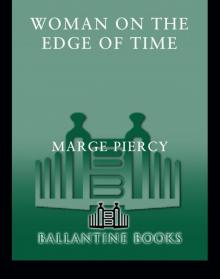 Woman on the Edge of Time
Woman on the Edge of Time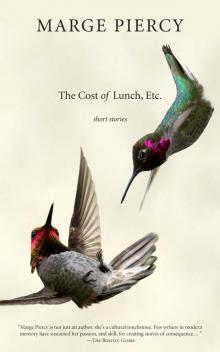 The Cost of Lunch, Etc.: Short Stories
The Cost of Lunch, Etc.: Short Stories Made in Detroit: Poems
Made in Detroit: Poems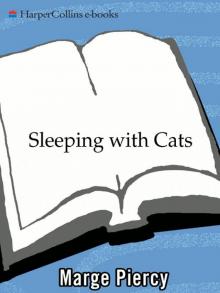 Sleeping With Cats
Sleeping With Cats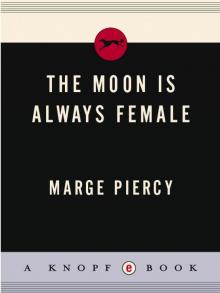 Moon Is Always Female
Moon Is Always Female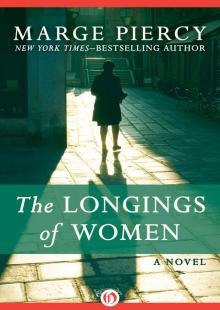 The Longings of Women
The Longings of Women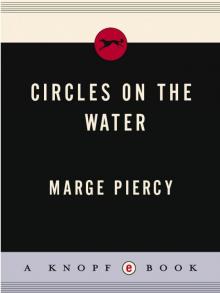 Circles on the Water
Circles on the Water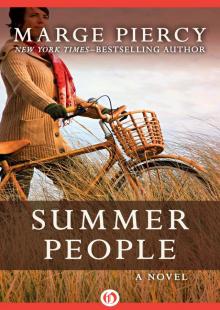 Summer People
Summer People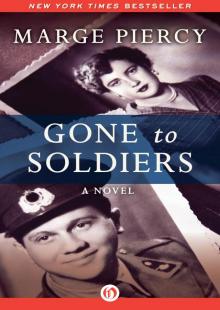 Gone to Soldiers: A Novel
Gone to Soldiers: A Novel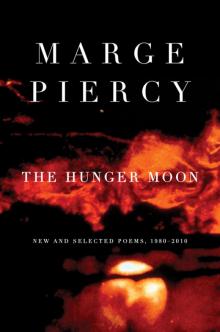 The Hunger Moon: New and Selected Poems, 1980-2010
The Hunger Moon: New and Selected Poems, 1980-2010 Vida
Vida Fly Away Home
Fly Away Home He, She and It
He, She and It So You Want to Write
So You Want to Write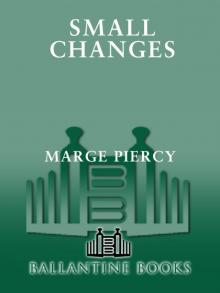 Small Changes
Small Changes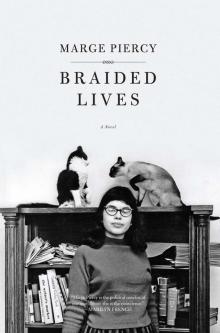 Braided Lives
Braided Lives Lord Valentine's Castle
Lord Valentine's Castle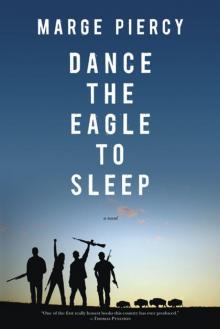 Dance the Eagle to Sleep
Dance the Eagle to Sleep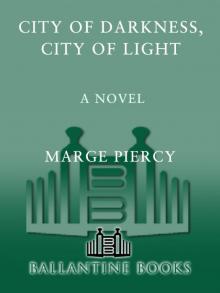 City of Darkness, City of Light
City of Darkness, City of Light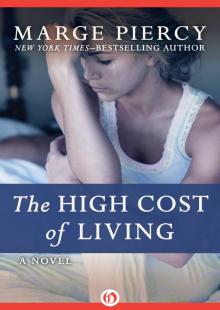 The High Cost of Living: A Novel
The High Cost of Living: A Novel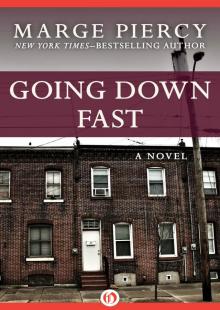 Going Down Fast: A Novel
Going Down Fast: A Novel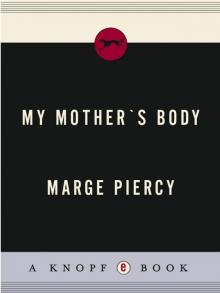 My Mother's Body
My Mother's Body Storm Tide
Storm Tide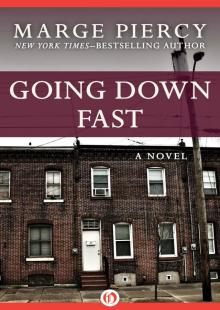 Going Down Fast
Going Down Fast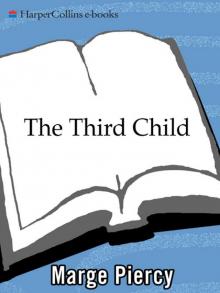 The Third Child
The Third Child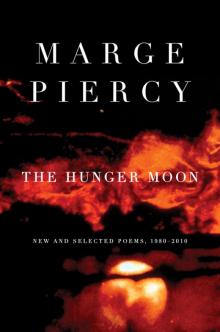 The Hunger Moon
The Hunger Moon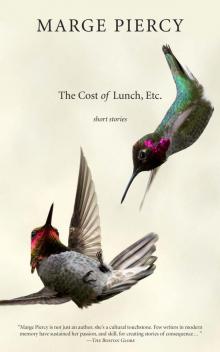 The Cost of Lunch, Etc.
The Cost of Lunch, Etc. Sex Wars
Sex Wars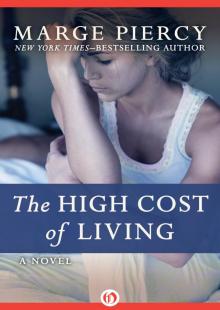 The High Cost of Living
The High Cost of Living Made in Detroit
Made in Detroit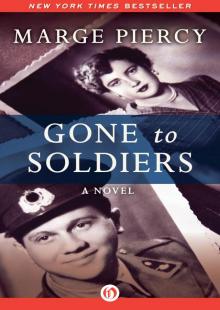 Gone to Soldiers
Gone to Soldiers